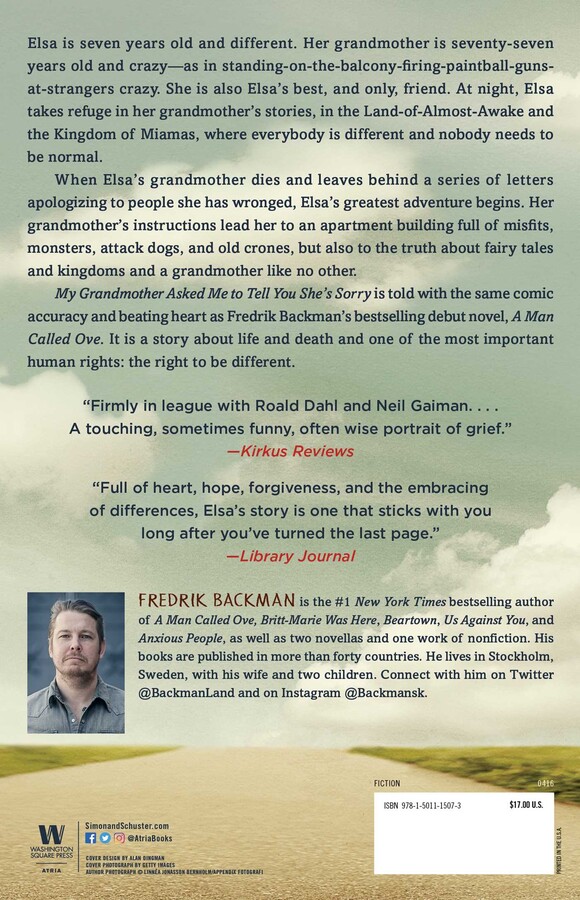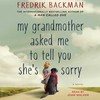Plus, receive recommendations and exclusive offers on all of your favorite books and authors from Simon & Schuster.
LIST PRICE $18.99
Get 30% off hardcovers with code MOM30, plus free shipping on orders of $40 or more. Terms apply.
Buy from Other Retailers
Table of Contents
About The Book
Elsa is seven years old and different. Her grandmother is seventy-seven years old and crazy—as in standing-on-the-balcony-firing-paintball-guns-at-strangers crazy. She is also Elsa’s best, and only, friend. At night Elsa takes refuge in her grandmother’s stories, in the Land-of-Almost-Awake and the Kingdom of Miamas, where everybody is different and nobody needs to be normal.
When Elsa’s grandmother dies and leaves behind a series of letters apologizing to people she has wronged, Elsa’s greatest adventure begins. Her grandmother’s instructions lead her to an apartment building full of drunks, monsters, attack dogs, and old crones but also to the truth about fairy tales and kingdoms and a grandmother like no other.
My Grandmother Asked Me to Tell You She’s Sorry is told with the same comic accuracy and beating heart as Fredrik Backman’s bestselling debut novel, A Man Called Ove. It is a story about life and death and one of the most important human rights: the right to be different.
Appearances
Cincinnati & Hamilton County Public Library
Montgomery Bell Academy Paschall Theater
Dallas Museum of Arts -Arts & Letters Series
Cuyahoga County Public Library
Reading Group Guide
Get a FREE ebook by joining our mailing list today! Plus, receive recommendations for your next Book Club read.
Introduction
Elsa is seven years old and different. Her grandmother is seventy-seven years old and crazy—as in standing-on-the-balcony-firing-paintball-guns-at-men-who-want-to-talk-about-Jesus crazy. She is also Elsa’s best, and only, friend. At night Elsa takes refuge in her grandmother’s stories, in the Land-of-Almost-Awake and the Kingdom of Miamas where everybody is different and nobody needs to be normal.
When Elsa’s grandmother dies and leaves behind a series of letters apologizing to people she has wronged, Elsa’s greatest adventure begins. Her grandmother’s letters lead her to an apartment building full of drunks, monsters, attack dogs, and totally ordinary old crones, but also to the truth about fairy tales and kingdoms and a grandmother like no other.
Questions and Topics for Discussion
1. My Grandmother Asked Me to Tell You She’s Sorry begins with the pronouncement, “Every seven-year-old deserves a superhero.” (page 1) Do you agree? Why is it so important that children have heroes? Who were your heroes when you were a child?
2. Names play a significant part in Elsa’s grandmother’s stories. How do the various kingdom and heroine names from the Land-of-Almost-Awake (Miamas, Miploris, Mimovas, Wolfheart, the Chosen One, the sea-angel, etc.) inform your understanding of Granny’s stories? Did you agree with how their real world counterparts were portrayed in the stories?
3. Elsa’s mother grew up in a nontraditional family environment. Do you think this influenced her parenting style with Elsa? In what ways?
4. Were you surprised by the ways in which each of the apartment tenants were connected to the others? Which relationship surprised you the most? Why?
5. Granny is a polarizing figure in My Grandmother Asked Me to Tell You She’s Sorry. Describe the way each of the characters reacts to her. Do you think their opinions of her are justified? Why or why not? What did you think of Granny? Do you know anyone like her?
6. Discuss the role that books, especially the Harry Potter novels, play in Elsa’s life. Why do you think Elsa relates to the Harry Potter books more than other novels? When you were growing up, were there books you particularly loved? Which ones and why?
7. What did you think of Britt-Marie when you first encountered her? Did she remind you of anyone in your life? Where do you think Britt-Marie goes at the end of the novel?
8. Elsa believes that her “teachers are wrong. [She] has no problems concentrating. She just concentrates on the right things.” (page 47) What kinds of things does Elsa concentrate on? How does this create problems for her? Do you think that Elsa is a good student? Why or why not?
9. Which of the characters in My Grandmother Asked Me to Tell You She’s Sorry surprised you the most? Why?
10. Discuss Britt-Marie’s marriage to Kent. Did you think they were well suited for each other? Do you think the marriage changed Britt-Marie? How can being in a bad relationship affect someone’s personality?
11. Fairy tales can provide a way to teach children some fundamental truths about the world. How do Granny’s fairy tales help Elsa understand the world around her? What lessons does Elsa take away from the tales her Granny tells her about life in the land of Miamas?
12. When her grandmother dies, Elsa is of course sad, but she also experiences a wide range of other emotions, including anger. Can you name some of the others? Consider how the loss of a loved one can lead us to have feelings that are much more complicated than sadness.
13. In this book, as in his previous novel A Man Called Ove, Fredrik Backman paints a vivid portrait of the relationship between an older person nearing the end of his or her life, and a young child. What can people at the opposite ends of life learn from one another? How are the very old and the very young alike? How are they different? When you were very young, was there an elderly person who played a significant role in your life? What did you learn from them?
Enhance Your Book Club
1. Kirkus Reviews says My Grandmother Asked Me to Tell You She’s Sorry puts Backman “Firmly in league with Roald Dahl and Neil Gaiman.” Read some of Dahl’s and Gaiman’s works and discuss them with your book club. Do you see any similarities between the works? What are they?
2. Granny’s fairytales provide comfort to Elsa. Why do you think that fairy tales are comforting to her and other children? Share some of your favorite fairy tales with your book club.
3. One of the themes in My Grandmother Asked Me to Tell You She’s Sorry is the attempt of one generation to reach another via fantastic stories, both successfully in the case of Elsa and Granny, and unsuccessfully in the case of Granny and Elsa’s mother. As a group, watch the movie Big Fish, which similarly explores this idea and contrast the ways in which the fairy tales in each story play a part in the intergenerational relationships.
Product Details
- Publisher: Atria Books (April 5, 2016)
- Length: 400 pages
- ISBN13: 9781501115073
Browse Related Books
Raves and Reviews
"Bring tissues when you start My Grandmother Asked Me to Tell You She’s Sorry, but bring your funnybone, too. It’s that kind of book – one that, if you miss it, you’ll never forgive yourself."
– Business Insider
“Every bit as churlish but lovable as Backman’s cantankerous protagonist in his debut, A Man Called Ove (2014), precocious Elsa will easily work her way into the hearts of readers who like characters with spunk to spare. A delectable homage to the power of stories to comfort and heal, Backman’s tender tale of the touching relationship between a grandmother and granddaughter is a tribute to the everlasting bonds of deep family ties.”
– Booklist (starred)
“Full of heart, hope, forgiveness, and the embracing of differences, Elsa’s story is one that sticks with you long after you’ve turned the last page.”
– Library Journal
“Firmly in league with Roald Dahl and Neil Gaiman. A touching, sometimes funny, often wise portrait of grief.”
– Kirkus Reviews
"In his second offering, Backman (A Man Called Ove) continues to write with the same whimsical charm and warm heart as in his debut."
– Publishers Weekly
“I can't remember the last time that I read a book where I alternately cried and laughed, and sometimes both at the same time.”
– Shelf Awareness
Resources and Downloads
High Resolution Images
- Book Cover Image (jpg): My Grandmother Asked Me to Tell You She's Sorry Trade Paperback 9781501115073
- Author Photo (jpg): Fredrik Backman Morgan Norman(0.1 MB)
Any use of an author photo must include its respective photo credit

























